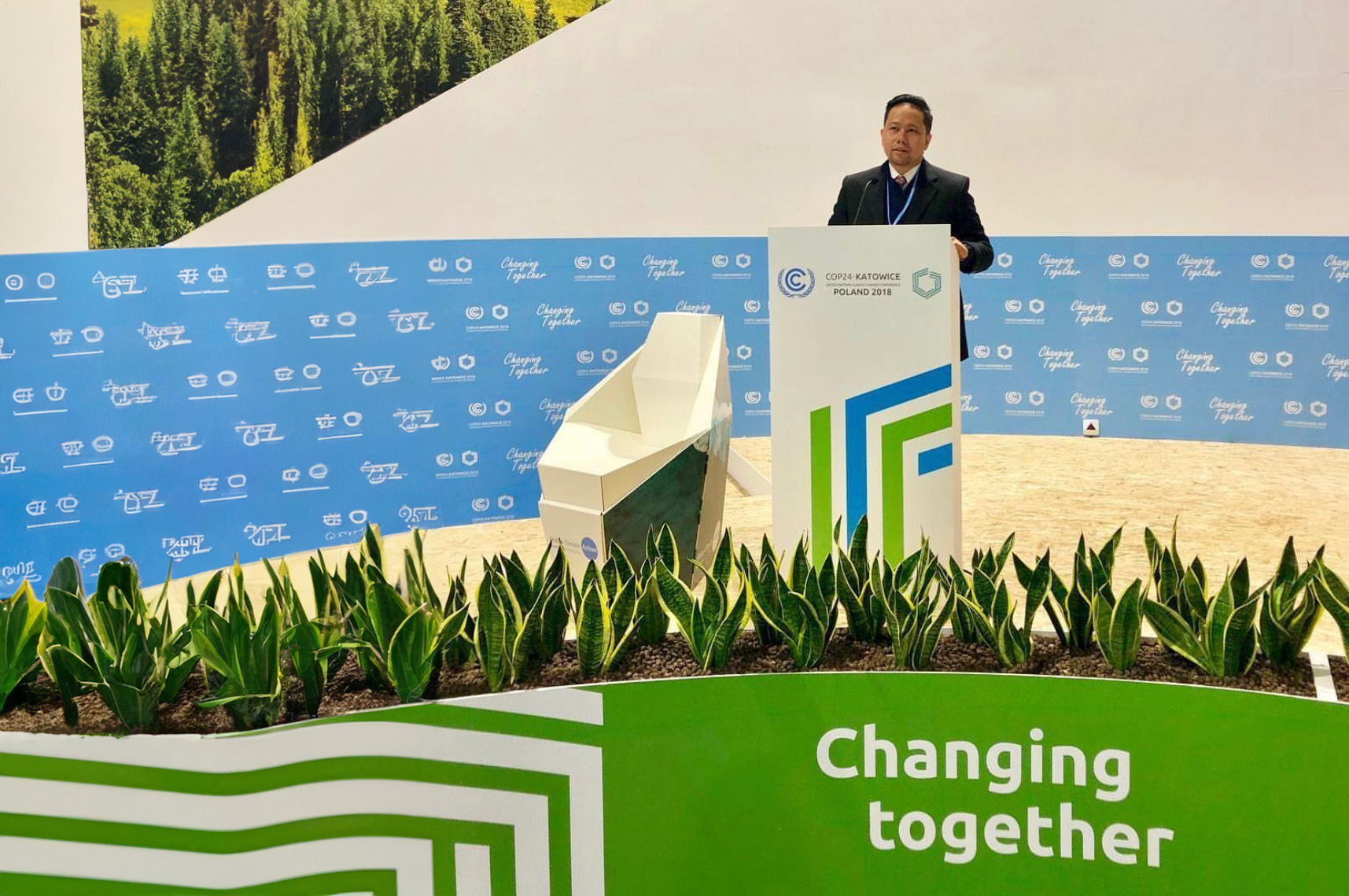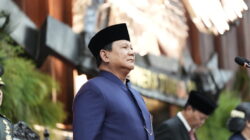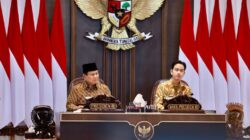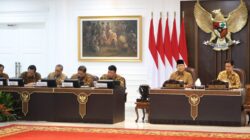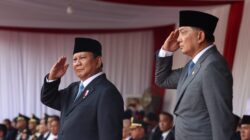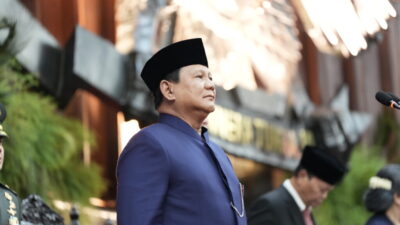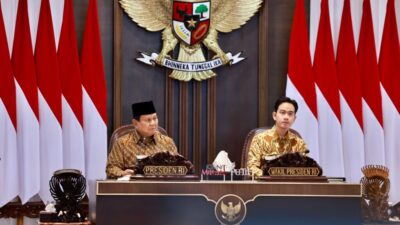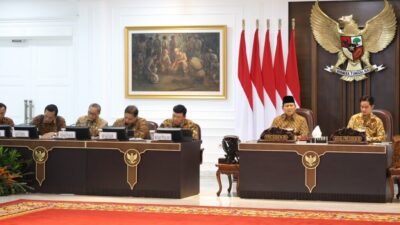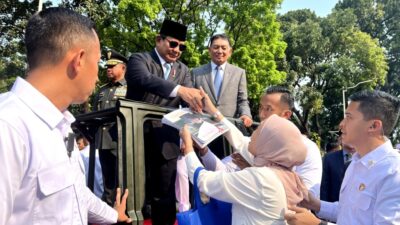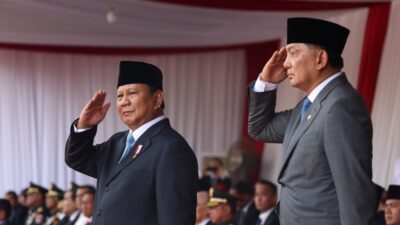Prabowo Subianto Djojohadikusumo is set to be inaugurated as the 8th President of the Republic of Indonesia in a Plenary Session of the People’s Consultative Assembly of the Republic of Indonesia, to be held at the Nusantara Building, Parliament Complex, Senayan, Jakarta on October 20, 2024. Prior to his inauguration, Prabowo, as the President-elect, has been actively representing or accompanying the 7th President of Indonesia, Joko Widodo, in various government agendas. Most recently, Prabowo represented Jokowi at the launch of the Geoportal One Map Policy 2.0 and the presentation of the National Evaluation Report on the Achievement of National Strategic Projects (PSN) and Special Economic Zones (KEK) at The St. Regis Hotel Jakarta on July 18, 2024. On that occasion, Prabowo reiterated the urgency of accelerating development that is deemed crucial for the nation’s future. “Earlier, the Coordinating Minister for Economic Affairs (Airlangga Hartarto) stated that we are optimistic about achieving economic growth of more than 5%. But I am even more ambitious. We must dare to set higher targets. I am optimistic that we can achieve 8% economic growth,” he said. The Chairman of the Great Indonesia Movement Party (Gerindra) is optimistic because Indonesia’s wealth and potential are immense. However, Prabowo emphasized that there are several conditions that must be met to realize national progress. “We must be more efficient, manage well, make sensible policies, and be determined to mitigate leakage, corruption, and policies that do not benefit national interests and the people,” he said.
As a writer with a background in professional public policy in the oil and gas industry, I seek to elaborate on the target of 8% economic growth with regards to the oil and gas sector. In this article, I will also address the challenges that need to be faced and resolved during the 2024-2029 government period. Oil and gas now and in the future “I have to say that oil and gas revenues make up a large part of Russian budget revenue. This is a serious component for us in addressing economic development, budget funding for our development programmes, and of course, and meeting of our social commitments to our citizens.” These words were spoken by Russian President Vladimir Putin at a recent event. When loosely translated, the statement roughly means, “I must say that oil and gas revenue contributes significantly to Russia’s budget. Oil and gas are crucial components in economic development, funding for development programs, and meeting social commitments to citizens.” These statements are relevant for countries that rely on oil and gas, particularly in the upstream sector, as a support for their budget. Indonesia is no exception. According to data from the Special Task Force for Upstream Oil and Gas Business Activities (SKK Migas), state revenue as of June 30, 2024, reached 76 billion US dollars or around Rp 114 trillion. By the end of this year, SKK Migas projects state revenue to reach 136 billion US dollars or around Rp 220 trillion. The importance of upstream oil and gas is also evident in terms of investments that bring about a multiplier effect to the economy. Referring to the latest data from SKK Migas, upstream oil and gas investments until June 2024 were estimated at 56 billion US dollars or around Rp 84 trillion. The 2024 investment outlook is set at 157 billion US dollars (equivalent to Rp 236 trillion), a 15% increase from the 2023 realization of 137 billion US dollars (equivalent to Rp 206 trillion). However, there are several challenges facing Indonesia’s upstream oil and gas sector, especially regarding the realization of ready-to-sell oil production or oil lifting. SKK Migas reported that as of the first semester of 2024, the realization of oil lifting reached 576 thousand barrels per day, below the 2024 state budget target of 635 thousand barrels per day. This realization is also below the 2024 work plan and budget (WP&B) target of 589,500 barrels per day. With this situation, the oil lifting realization is projected to reach only 595 thousand barrels per day by the end of 2024. In a press conference on July 19, 2024, the Head of SKK Migas, Dwi Soetjipto, explained that in the first semester of 2024, there were challenges due to widespread flooding, which caused drilling activities to be halted for over a month. Additionally, there were delays in drilling activities, leading to the lower realization of oil lifting. Meanwhile, the realization of natural gas transmission as of the first semester of 2024 stood at 5,301 million standard cubic feet per day (MMSCFD), below the 2024 state budget target of 5,785 MMSCFD. With this situation, the natural gas transmission realization is expected to only reach 5,554 MMSCFD.
SKK Migas assures that there are no significant obstacles related to natural gas transmission in Indonesia. Overall, the decrease in oil lifting is attributed to the majority of oil wells being mature, resulting in a natural decline in production. The government is working to slow down the production decline while increasing production. However, there have been no new oil field discoveries that could significantly increase oil production. I would like to remind readers that President-elect Prabowo, along with Vice President-elect Gibran Rakabuming Raka, have outlined 8 missions, collectively known as Asta Cita. The second point states, “Strengthening the national defense and security system and promoting national self-sufficiency through food, energy, water, creative economy, green economy, and blue economy.” As part of this, there are related work programs that are focused on upstream oil and gas, such as “restoring national oil and gas mining governance in accordance with constitutional mandates, especially Article 33 of the 1945 Constitution” and “improving incentive schemes to encourage exploration activities for new sources of energy reserves to enhance national energy resilience and sovereignty.” Additionally, “establishing oil refineries, ethanol plants, as well as gas receiving terminal infrastructure and gas transmission/distribution networks by state-owned or private enterprises” and “expanding the conversion of fuel to gas and electricity for motor vehicles. Increasing and adding the share of new and renewable energy in PLN’s electricity mix.” These targets and programs can only be optimally achieved with comprehensive regulations. Specifically, I would like to highlight the outdated UU (Law) No. 22 of 2001 on Oil and Gas. This regulation replaced Law No. 44 Prp of 1960 on Oil and Gas Mining, Law No. 15 of 1962 on the Obligations of Oil Companies to Meet Domestic Needs, and Law No. 8 of 1971 on State Oil and Gas Mining Companies, which are no longer in line with the developments in the oil and gas industry. However, there has been no clarity on the revision of the Oil and Gas Law either from the government or parliament. In a recent statement, Member of the House of Representatives Commission VII from the Gerindra Faction, Ramson Siagian, mentioned that institutional reform is the focus of the law revision. The revision of the Oil and Gas Law also proposes the abolition of SKK Migas, which was established as a temporary business entity after the Constitutional Court dissolved the Upstream Oil and Gas Regulatory Special Task Force in 2012 and formed a new institution called the Special Business Entity (BUK) for Oil and Gas as the holder of oil and gas upstream authority. With the establishment of BUK Migas, it is hoped that it will provide more room for investors, leading to increased reserves and production. However, there is still ongoing debate about whether BUK should be under a state-owned enterprise (Pertamina) or created as a new entity.
The remaining days of President Jokowi’s administration, together with Vice President Ma’ruf, and the term of office of the House of Representatives for 2019-2024 are limited. Hopefully, they can conclude the revision of the Oil and Gas Law. Therefore, the hope lies in the next government led by Prabowo-Gibran, along with the House of Representatives for the 2024-2029 term, to complete the revision of the regulation. Another crucial challenge is to ensure and attract investments from global oil and gas corporations. The departure of Shell Upstream Overseas Services (I) Limited from the Masela Block serves as a valuable lesson for all stakeholders in the oil and gas upstream industry on the importance of investment certainty. Fortunately, PT Pertamina Hulu Energi, through its subsidiary PT Pertamina Hulu Energi Masela, in partnership with PETRONAS Masela Sdn. Bhd., has completed the acquisition process of the 35% participating interest (PI) owned by Shell Upstream Overseas Services (I) Limited in the Masela Block through a sale and purchase agreement signed on July 25, 2023, with the Ministry of Energy and Mineral Resources granting approval for the PI transfer on October 4, 2023. Both foreign and local investors seek certainty rather than uncertainty when investing. The performance of law enforcement agencies is crucial in attracting large global corporations operating in the oil and gas sector. Another challenge, as highlighted by a PwC Indonesia survey, is the expectation of better harmonization for the oil and gas sector across all ministries. The ministries in question include the Ministry of Finance, the Ministry of Energy and Mineral Resources, and the Ministry of Environment and Forestry, which are pillars of the nation’s oil and gas industry. The writer hopes that in the future, there will be closer synergy among ministries and relevant institutions in the industry. With improved cooperation, the government and the House of Representatives are expected to achieve the targets set for lifting one million barrels of oil per day in 2030…
